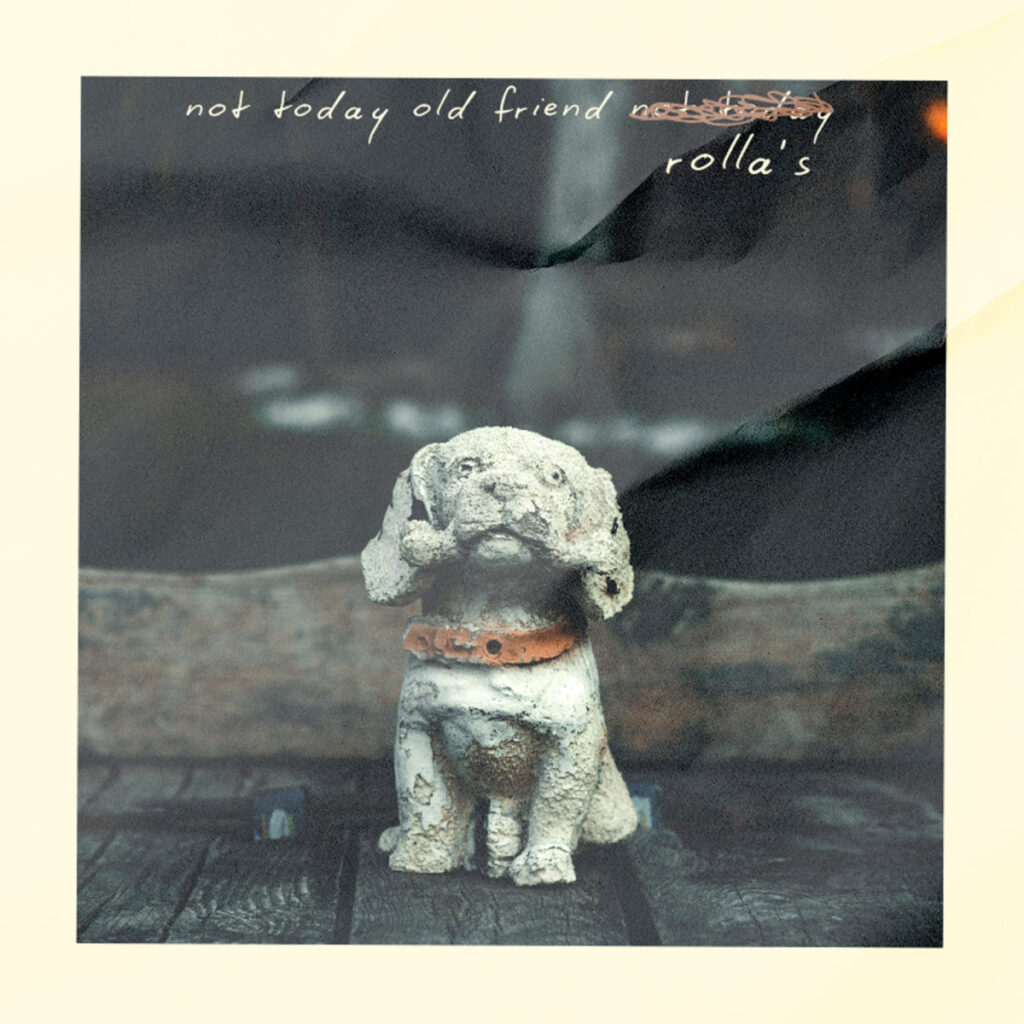Have you ever been alone in a crowded area—say, a coffee shop or a diner—and despite knowing you’re surrounded by people, you still end up feeling so impossibly alone? From the first few seconds of Rolla’s “Not Today Old Friend”, the loneliness beyond any specific name rings out. The one-man band is reportedly a solo project of Vallen Koscheev in Vancouver, according to the press release provided to us here at Start Track; a multi-instrumentalist with experience drumming in Name Killer Birchenson and Softhead. Koscheev writes to us, “the album in general (…) is an attempt at blending emo vulnerability with math rock intricacies and indie rock charm”. The heart bleeds through Koscheev’s lyrics, delicate as a dried leaf carried on his tense, aching vocals; seemingly disconnected melodies and rhythms fall together like fate.
From the first full listen of the EP, I recognized a specific pattern in Rolla’s songs: musically, each piece is a showcase of four distinct concepts developed to unique ends. Simple melodies and hi-hat beats are enriched over time with harmonies, steady counterpoint in the bass line, warm chords, and snappy drums, and piece by piece, the musical equivalent to an errant thought develops into a single grand idea—only to quickly usher us, the audience, along to the next part of the showcase. The only actual connective tissue between each track is its lyrics, which match the tone of the text to the mood of the music while remaining focused enough on a single concept to create a coherent narrative.
Such is the case with the EP’s featured track, “Let’s Go To The Old Mill Anyway To Get Some Cider”. Koscheev shares that the song shares the story of a breakup from the perspective of a tree and its fallen leaf. The intro to the track features a swaying, descending melody that is resonant yet hints at quiet desperation amidst outward resignation to one’s circumstances. The beat changes to something more upbeat and, in the case of the guitar’s part, technically challenging to match the introduction of the vocals.
I have to fall
You should let me go
Maybe I’ll try to stay around
until the wind blows me off
And you’ll be here, wherever I go
There is a sense here that this separation was for the best, or perhaps was as inevitable as the shedding of a tree’s leaves each autumn. While the singer clearly still holds some measure of affection for their past lover, their “tree”, the lyrics make clear that there is nowhere left for the pair to go but apart. The transition from one rhythmic sequence to the next is practically seamless, beginning the next musical concept in the showcase with the final note of the idea before it; the chords faintly hint at what the vocals echo on their cue with a more introspective sound:
I miss the spring
And there it is: a leftover longing. While the connection has been unavoidably and irrevocably severed, there is still a desire to reattach. This yearning to reconnect tinges the remainder of this section, as the sustained vocals echo an electric guitar gently plucking a simple rhythm; the sounds, basic in a vacuum, coalesce into something greater than the sum of their parts. We’re ushered quite suddenly, and in a comparatively jarring manner, to the last transition between concepts, into the final musical statement of the song.
The same hesitant resignation presents itself in the sound of the last section, pained yet busy. A repeating motif in the treble line whizzes past like streetlights on a late drive home; the bassline drives the sound further along, sustained on a single note until the need arises to loop and close the statement. Occasionally, the bass wrong-foots the listener and even leads it to a false end before picking back up with a flourish and the splash of a cymbal. By the time the song ends in earnest, the music stops just shy of a finished repetition. The second-to-last note of the phrase hangs open and unresolved in the air, unanswered and left far behind in the distance. In a phrase: There is no going back.
Other points of note include the occasional use of electronic drums, such as in “This Ominscient Point of View Has Some Bonuses”, to give the track a more funky and snappy sound. I would have to say that the cleanest transitions between phrases can be found in “Sitting Here Depressed When I’m Surrounded By The Happiest People In The World”, structured in such a way that it brings to mind the orchestra pit hurriedly playing during a set transition for a stage play. My favorite guitar solo has to be the intro for “Father Of The Year, Pal, Father Of The Year”, evolving and transforming from something nearly plaintive to a much more bitterly sardonic, tongue-in-cheek yet accepting sound by the two-minute mark.
All in all, if you’re in the market for something proven successful in the experimental “genre” (and I use the word “genre” in a very loose sense, more referring to the arbitrary category in which the work of innovative artists seeking to expand their home genres is oft unceremoniously placed, as if even a leap of artistic faith is nothing more than a hypothesis to be tested in isolation), Rolla’s “Not Today Old Friend” has you covered. Those looking to appreciate musical mastery without a desire to entrench themselves emotionally will be more than satisfied by Koscheev’s virtuosity. Those looking to make themselves vulnerable may just find themselves suddenly transported back to the humid days of summer break in middle and high school when they’d grappled with their first heartbreak or the prospect of what to do after graduation.
Written by Alexei Lee



